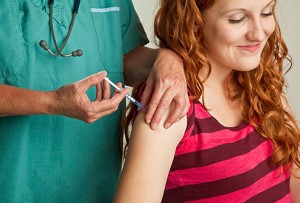 The human papillomavirus (HPV) vaccine has been touted as a way to prevent cervical cancer and genital warts, but a new study suggests the vaccine may also prevent women diagnosed with precancers from developing recurrences.
The human papillomavirus (HPV) vaccine has been touted as a way to prevent cervical cancer and genital warts, but a new study suggests the vaccine may also prevent women diagnosed with precancers from developing recurrences.
Researchers randomly assigned more than 1,350 women diagnosed with genital warts or certain precancerous conditions to receive either three injections of the HPV vaccine or a placebo. The women were followed for about four years.
Women who received the vaccine had 46.2 percent lower risk of developing another HPV-related disease after treatment for their genital warts or their precancerous condition.
Typically, women treated for these types of conditions are at risk for subsequent disease later, but the study offers evidence that “vaccination offered substantial benefit” in terms of lowering that risk, wrote the international team of authors, led by Elmar Joura, an associate professor at the University of Vienna in Austria.
Experts not involved with the research told ABC News that the research is significant because it suggests for the first time that the HPV vaccine may offer benefits beyond prevention.
“We always thought about the vaccine from the prevention, and this suggests it can lower the risk of developing a second episode of disease,” said Dr. Anna Giuliano, director of the Center for Infection Research in Cancer at the Moffitt Cancer Center in Tampa.
Giuliano cited another study published online in January that found the HPV vaccine reduces the recurrence of abnormal anal cell growths in men.
“We’re now seeing a pattern with cervical, vulvar, vaginal and anal dysplasias,” she said. “There are prevention effects beyond the first case of disease.”
While the findings seem to offer more promise for the HPV vaccine, it’s too soon to say whether clinicians will be able to use it for something other than primary prevention of cervical cancer and genital warts in girls and women who have not yet been exposed to the virus through sexual contact.
“It sometimes takes decades to go from HPV infection to pre-invasive disease to cancer, so we’re going to need a long period of time before we’re going to see cervical cancer prevention or reduction in women who are vaccinated,” said Dr. Ursula Matulonis, medical director of medical oncology at the Dana-Farber Cancer Institute in Boston.
Currently, vaccination is recommended for 11 and 12-year-old girls, as well as for girls and women ages 13 through 26, who have not been vaccinated or have not completed the series of vaccines. The Centers for Disease Control and Prevention also recently expanded the recommendations to include 11 and 12-year-old boys. They also recommend that men and boys ages 13 through 21 should also get caught up with their HPV vaccinations.
Pre-cancerous gynecologic conditions are a major headache for the many women who live with them because of the risk of developing HPV-related diseases. There currently is no way to prevent the recurrence of these conditions, meaning clinicians must regularly monitor them.
“Most women that become carriers of HPV will clear the infection on their own, but more high-risk type of the virus will stay in the system, and as long as they carry it, dysplasias can occur,” said Dr. Ginger Gardner, a gynecologic oncologist at Memorial Sloan-Kettering Cancer Center in New York. “Once there’s a dysplasia, it requires continued surveillance. There are a lot of health care dollars given to screening diagnosis and management of dysplasias.”
In an editorial accompanying the study, Jane Kim, assistant professor of health decision science at the Harvard School of Public Health, wrote that learning more about the vaccine’s ability to prevent these gynecologic conditions and its other potential benefits is crucial.
“Worldwide, decision makers who are increasingly considering adopting HPV vaccination programs need information on the total potential health gains and the priority target groups for vaccination,” she wrote. “The current study moves us closer to understanding the full scope of benefits from HPV vaccination by showing for the first time that vaccine protection against disease can endure beyond the management of HPV-related disease in women already vaccinated.”
No Comments Yet